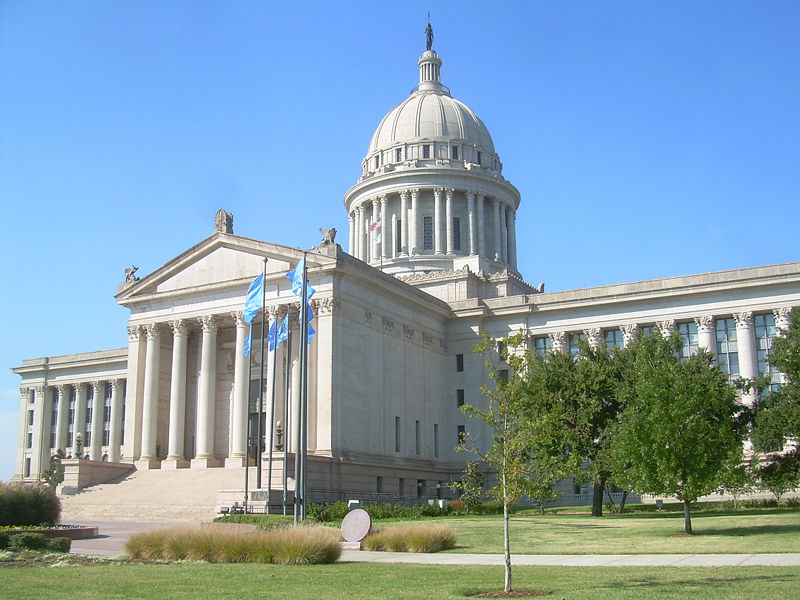The head of the Oklahoma chapter of the Council on American-Islamic Relations (CAIR-OK), Muneer Awad, has sued to prevent the Election Board from certifying Tuesday’s referendum on State Question 755. On Monday, U.S. District Judge Vicki Miles-La-Grange issued an injunction stopping certification of the election results.
At a state Capitol press conference with 11 television cameras and at least that many print reporters, Awad agreed, in response to a question from CapitolBeatOK, that seeking to prevent certification of the results is probably unprecedented.
The proposition garnered 695,568 votes (70.08% of the total) in favor, with 96,903 (29.92%) against. Awad said the 30% who voted no were a source of encouragement.
Also speaking at the press briefing were Chuck Thornton (Deputy Director, ACLU-Oklahoma), Imad Enchassi (Imam, Islamic Society of Greater Oklahoma City — ISGOC) and Nathaniel Batchelder (Director, Central Oklahoma Human Rights Association — COHRA).
State Question 755 amends the Oklahoma Constitution to explicitly say that judicial rulings based in or drawn from foreign precedents have no bearing on state courts. While the amendment would apply to all non-domestic law, its ban on “Sharia” is attracting the most attention.
House Joint Resolution 1056, by state Rep. Rex Duncan (a Sand Springs Republican) and state Sen. Anthony Sykes (a Moore Republican), placed the “Save Our State” amendment before voters.
The amendment requires courts to “uphold and adhere to the law” as provided in the U.S. and state Constitutions, the U.S. Code and federal regulations, statutes and rules, and established common law. It bans courts from considering the legal precepts of other nations or cultures, including in cases of first impression (where no law or precedent is in place to resolve the dispute). The proposed amendment declares that courts “shall not consider international law or Sharia Law.”
Awad agreed there is a credible legal position to oppose use of foreign case precedents in domestic U.S. cases, but said the amendment’s provisions against international law would put the state in violation of federal constitutional requirements.
In concluding remarks, Awad described the new provision as “extremely broad, and extremely offensive.” He said adherents of Sharia and Islam are bound by religious duty “to respect the law of the land.”
Batchelder, who runs the Peace House in Oklahoma City, said that S.Q. 755 was “pointless and anti-Muslim.” Thornton of the ACLU said he was “amazed the continuing ability of the Legislature to waste its time.” He speculated the amendment could have a negative impact on economic development.
Enchassi summarized how he believes S.Q. 755 violates the U.S. Constitution. He and other speakers chided Sen. Sykes, who praised passage of S.Q. 755. Awad said “solidarity to the Constitution and to one another” requires the effort to seek to prevent certification of the election results.
The use and application of international law in the U.S. has received growing attention as several court decisions have referenced international statutes or precedents. While “original meaning” or “original intent” jurists explicitly reject use of foreign precedents, many less conservative analysts do so, as well.
Since the 1980s, Sharia has been more than an academic question in Great Britain, where the legal system is most like America’s. In London, on Sept. 14, 2008, both The Times and The Telegraph reported that the British government had sanctioned Sharia courts to rule on Muslim civil cases. The decision sparked widespread controversy. Recent Demonstrations in London and surrounding jurisdictions found both supporters and critics of Sharia.
Sharia existed to a limited extent in Great Britain after 1982, with the opening of London’s Islamic Sharia Council. Today, there are as many as 85 Sharia courts in Britain, but not all those carry the force of law.
Duncan, an attorney and chairman of the House Judiciary Committee, contends that the values of the American judicial system are different than other countries’ systems. He argued that allowing courts to cite international law is an invitation to undermine the liberties of Oklahomans.
During the campaign for S.Q. 755, Duncan was interviewed by several national news outlets. To make the ballot, it passed the state House on an overwhelmingly bipartisan 82-10 vote, then cleared the Senate, 41-2.
Supporters said, in “robo-calls” before the election, the measure would prevent use of oppressive foreign legal precedents, but would not preclude the religious practices of Muslims.
CapitolBeatOK.com

